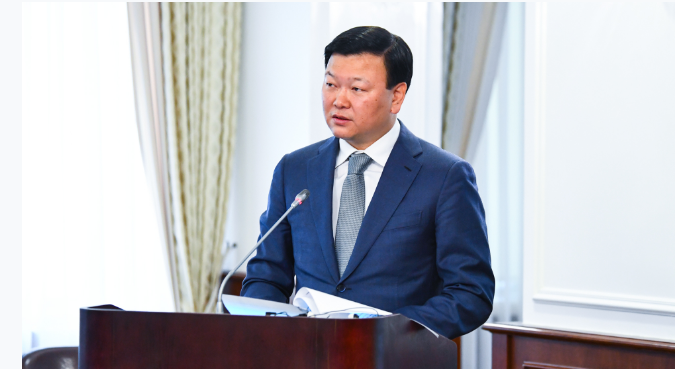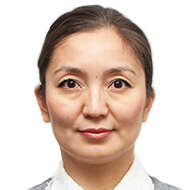On September 7, 2021, a regular meeting of the Board of the Ministry of Healthcare was held in Kazakhstan. The meeting was attended by the Minister of Healthcare Alexey Tsoy (on the photo), his First Vice-minister Marat Shoranov, Vice-Minister Azhar Giniyat, as well as the Chairman (CEO) of the Social Health Insurance Fund of Kazakhstan Bolat Tokezhanov.
Since the Mandatory Social Health Insurance in Kazakhstan is the largest health sector reform since independence, it duly receives attention from national policy-makers and Prime-Minister’s Office in terms of its successes and failures, and status of implementation.
Bolat Tokezhanov, CEO of the Social Health Insurance Fund, has presented the status of implementation of mandatory social health insurance and updated about the supply of drugs and medical devices purchased centrally for public health care organizations participating in the insurance.
As of July 1, 2021, 83.5% of the total population participates in mandatory social health insurance, which is 15.85 million people. The composition of social health insurance participants is as follows:
- more than half (60.2%) are state-protected groups fully covered by the government (such as seniors, children under 18, prisoners, etc.);
- 27.9% are salaried workers;
- 4% are freelancers (individuals providing services on a contractual basis)
- 2.5% are individual entrepreneurs (small to medium businesses);
- 1.3% are the socially vulnerable self-employed groups who pay the “Single Social Payment” which goes into social protection, health insurance, social insurance and retirement funds simultaneously and automatically from a single payment;
- 1.3% are self-employed people who opted to pay for health insurance separately.
This participation rate applies to the second tier of the benefits package called “The Insurance Package”. This tier includes elective hospital care; tertiary and high-technology services and products.
It important to note that the entire population of Kazakhstan (100%) is entitled to the first tier of the benefits package called “Guaranteed Volume of Free Medical Care”. The “Guaranteed Package” includes primary health care; care for socially significant diseases at all levels of care (the list of such defined by the MoH; includes infectious diseases – TB, COVID-19, as well as common chronic diseases).
Compared to January 2021, within six months, the overall share of Social Health Insurance participants decreased by 2% (328 038 people), which is undesirable. The number of Social Health Insurance participants has increased in absolute numbers compared to last year – 14.9 million people in 2020 versus 15.85 million people in the first half of 2021.
The concerning group is the 3 million people left out of the Insurance Package. Of these, 1.6 million are irregular contributors and 1.5 million are non-contributors since 2020. ”These people always have the right to receive medical services within the guaranteed volume of free medical care”, reminded Bolat Tokezhanov. The largest number of uninsured people are among residents of Kostanay region (23.2%), and the economically disadvantaged southern regions – Almaty oblast (22.3%), Turkestan (21.8%) and Zhambyl (20.2%) regions.
Bolat Tokezhanov listed top challenges regarding coverage within health insurance system, such as the difficulties with identification and status update for the self-employed population, and lack of access to the Insurance Package by the unemployed and some of the hired workers whose contributions are not regular or absent.
According to Mr Tokezhanov, regional project offices set up since 2019 to sign up people into the Social Health Insurance system, need to increase their efficiency of work in attracting insurance participants. He added that “local executive bodies, public health departments, health care organizations, and the National Chamber of Commerce and local Tax Offices need to actively help the Insurance system in facilitating participation.”
Social Health Insurance Fund also reported about its role in financing COVID-19-related medical care and activities. In total, 219 billion tenge (515.3 million USD) were allocated to finance activities within half of this year, including 197.6 billion tenge (90%) at the expense of the guaranteed volume of medical care (budget re-purposed from general Tier 1 care to COVID-19 inpatient and outpatient care), and 21.4 billion tenge (10%) at the expense of the mandatory health insurance package (budget re-purposed as well).
Of these “COVID-19 funds”, 112.8 billion tenge (51.5%) were paid for medical services, and 106.2 billion tenge (48.5%) were salary bonuses paid to medical workers involved in caring for COVID-19 patients.
As B. Tokezhanov recalled, financial support for doctors has been provided since March 2020 as additional bonuses to their regular salaries across three risk groups as defined by the government: Group I – 850 thousand tenge (about 2000 USD per month); Group II – 425 thousand tenge (about 1000 USD per month); Group III – 212.5 thousand tenge (about 500 USD per month). In total, by June of this year, about 229 billion tenge was allocated for these purposes.
Successes of the reform
One of successes of introducing the financing reform is the development of e-health. A number of digitalization solutions were implemented to shorten waiting times for medical care and turn-around times for getting laboratory and imaging results electronically. For example, documentation time for drawing blood reduced by 2.5; waiting time for an appointment to specialist doctors reduced by 5-fold; ordering/referring to laboratory and diagnostic tests shortened by 3.5 times.
Also, despite the pandemic, the volume of outpatient consultative and diagnostic care has increased. This means that in addition to primary health care, people had better access to specialized medical care at primary health care organizations called “polyclinics”. The number of consultations and diagnostic services increased by 31% in the first half of 2021, compared to the same period in 2020. In total, 41.1 million services were rendered for 70 billion tenge, which is by 12.7 million tenge more than in the first half of 2020.
Another strong benefit of mandatory health is the significant increase in the number of types and volume of covered (free) medicines at the outpatient level. The list of diseases in which patients are provided with free medicines has been expanded from 45 to 138 names of diseases.
Formerly as challenge, reducing waiting times was pursued for a while. As a result of national and local efforts, “the number of patients awaiting planned hospitalization for as long as 10 days or more has decreased by 42%”, said the head of the Insurance Fund.
B. Tokezhanov also added that the Fund continues to stimulate the development of rehabilitation services, including at the outpatient level. The number of rehabilitation service providers of increased by 20 times from 64 to 618 organizations, and the volume of financing for rehabilitation services surpassed 22 billion tenge.
Among other issues discussed in the agenda of this meeting were the Address of the President of Kazakhstan given on September 1, 2021, the implementation of the State Healthcare Development Program of the Republic of Kazakhstan for 2020-2025 and the newly introduced national project titled “Healthy Nation-2025”, as well as introduction of professional liability insurance for health care workers, steps to improve the sanitary and epidemiological service and biological safety in Kazakhstan.


